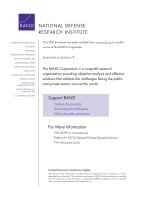final report applied calculus for information technology
Bạn đang xem bản rút gọn của tài liệu. Xem và tải ngay bản đầy đủ của tài liệu tại đây (1.29 MB, 23 trang )
<span class="text_page_counter">Trang 1</span><div class="page_container" data-page="1">
<b>FACULTY OF INFORMATION TECHNOLOGY</b>
<b>DƯƠNG MINH HIẾU-523H0028NGUYỄN CAO KỲ-523H0049</b>
<b>FINAL REPORTAPPLIED CALCULUS FORINFORMATION TECHNOLOGY</b>
<b> HO CHI MINH CITY, 2024</b>
</div><span class="text_page_counter">Trang 2</span><div class="page_container" data-page="2"><b>DƯƠNG MINH HIẾU-523H028NGUYỄN CAO KỲ-523H0049</b>
<b>FINAL REPORTAPPLIED CALCULUS FORINFORMATION TECHNOLOGY</b>
<b>M.A. Phạm Kim Thủy</b>
<b> HỒ CHÍ MINH CITY, 2024</b>
</div><span class="text_page_counter">Trang 3</span><div class="page_container" data-page="3">First of all, I want to thank Ton Duc Thang University, Department of Information Technology, software engineering industry and I want to thank my teacher, Ms. Pham Kim Thuy. Perhaps because of exposure to a completely new learning environment and creative instructors, my mind felt excited, happy, and surprised. What pleased me most was that, in the first semester, I had the opportunity to interact with Ms. Pham Kim Thuy's Applied Calculus for Information Technology curriculum. I would like to express my sincere gratitude for her passion for teachingand imparting knowledge, which has provided an important support for me to have a source of information about mathematics. applications for the information technology industry.
In addition, I would like to thank the speaker who contacted Ton Duc Thang University, helping me complete this article successfully. Both provided their experiences, such as how to write an article, or how to organize it, so that I could filter the material more clearly.
Finally, I want to wish Ton Duc Thang University, the Department of Information Technology, the Department of Applied Calculus for Information Technology and Ms. Pham Kim Thuy to achieve achievements in life, achieve all goals, especially inthe field of education. As a first-year student, I found that eliminating the limitations in this essay was a challenge, so I looked forward to the advice and comments of the class teacher, Ms. Pham Kim Thuy, to help me complete it. into this essay better in the near future
<i> Ho Chi Minh city, </i>7<i><sup>th</sup> January, 2024 Author</i>
<i> Dương Minh Hiếu Nguyễn Cao Kỳ</i>
</div><span class="text_page_counter">Trang 4</span><div class="page_container" data-page="4"><b>AT TON DUC THANG UNIVERSITY</b>
I hereby declare that this is my own research work and is under the scientific guidance of M.A. Phạm Kim Thủy. The research content and results in this topic are honest and have not been published in any form before. The data in the tables for analysis, comments, and evaluation were collected by the author from different sources and clearly stated in the reference section.
In addition, the Project also uses a number of comments, value assessmentsas well as data from other authors and other organizations, all with citations and source notes.
If any nano species are discovered, I will take full responsibility for the content of my Project. Ton Duc Thang University is not related to these
<i> Hồ Chí Minh city , </i>7<i><small>th</small> January, 2024 Author</i>
<i> Dương Minh Hiếu Nguyễn Cao Kỳ</i>
</div><span class="text_page_counter">Trang 5</span><div class="page_container" data-page="5">I applied the mathematical rules, laws, and theorems I learned to my final
<b>report in applied calculus for information technology course, such as </b>
<b>Even-Odd functions, Infinite limits, Derivatives of functions, The equation of tangent line, First derivative test, Arc length formula, and The Ratio test. This enabled me to successfully complete the report, fostering a deeper</b>
comprehension of mathematical operations while solidifying the knowledgeI had acquired.
</div><span class="text_page_counter">Trang 7</span><div class="page_container" data-page="7"><b>CHAPTER 1.SOLUTION</b>
<b>1.1 QUESTION 1</b>Tell whether the following functions are even, odd, or neither. Give reasons for your answer.
<b> SOLUTION:</b>
Even function: for all in the domain of . Odd function: for all in the domain of
Now, let’s analyze the given function:
Substitute into the function: Now, compare with :
<i>If f</i>(<i>x</i>)<i>=f</i>(<i>−x</i>)<i>⟹ Functioneven .If f</i>(<i>x</i>)<i>=−f</i>(<i>−x</i>)<i>⟹ Function odd .If f</i>(<i>x</i>)<i>≠ f</i>(<i>−x</i>)<i>⟹ Neither .</i>
</div><span class="text_page_counter">Trang 8</span><div class="page_container" data-page="8"><i>f</i>(<i>x</i>)= <sup>4</sup>
Determined set: <i>D ∈ R</i>¿−
√
2<i>;</i>√
2}¿ <i>f</i>(<i>−x</i>)= <sup>4</sup>(<i>−x</i>)<small>4</small>
−4 <i>⟹ f</i>(<i>x</i>)<i>=f (− )x</i>
<i>⟹ Functionis even .</i>
<i>f</i>(<i>x</i>)= <i><sup>x</sup></i><small>3</small>
Determined set: <i>D ∈ R</i>¿−
√
2<i>;</i>√
2}¿ <i>f</i>(<i>−x</i>)= <sup>(</sup><i><sup>−x</sup></i><sup>)</sup><small>3</small>
<i>x</i><small>4</small>−4 <i>⟹ f</i>(<i>x</i>)=− (− )<i>fx</i>
<b>1.2 QUESTION 2</b>
Find the following limit lim <sup>555</sup>
<i>x</i><small>2</small>−25<sup> as:</sup>
<b> SOLUTION:</b>
<i>x → 5</i><sup>+</sup><sup>¿¿</sup>
<b>As approaches 5 from the right </b> :
Substitute , where is a small positive number approaching zero:
</div><span class="text_page_counter">Trang 9</span><div class="page_container" data-page="9">Since is approaching zero, the term becomes negligible:
This limit is also infinite, as the denominator approaches 0.Limit as approaches 5 from the right is <i>+∞</i>
<i>x → 5</i><sup>−</sup><sup>¿ ¿</sup>
As x approaches 5 from the left :
Substitute , where is a small positive number approaching 0:
Since is approaching 0, the term becomes negligible:
This limit is also infinite, as the denominator approaches 0. Limit as approaches 5 from the left is −∞.
</div><span class="text_page_counter">Trang 10</span><div class="page_container" data-page="10"> <i>x →</i>−5<small>+¿¿</small>
<b>As approaches -5 from the right </b> :
Substitute , where is a small positive number approaching 0:
Since is approaching 0, the term becomes negligible:
So, this limit is negative infinity, as the denominator approaches 0 from thenegative side.
Therefore, the limit as approaches from the right is ∞.
<i>x →</i>−5<small>−¿ ¿</small>
As approaches -5 from the left :
</div><span class="text_page_counter">Trang 11</span><div class="page_container" data-page="11"> Substitute , where is a small positive number approaching 0:
Since is approaching zero, the term becomes negligible:
This limit is positive infinity, as the denominator approaches 0 from the positive side.
Limit as approaches from the left is +∞.
<b>1.3 QUESTION 3</b>
Find the derivative <i><sup>dy</sup><sub>dx</sub></i> of the following functions:
<b> SOLUTION:</b>
To find the derivative of the given function , we can use the
quotient rule. The quotient rule states that if you have a function , then the derivative is given by:
</div><span class="text_page_counter">Trang 12</span><div class="page_container" data-page="12">2
√
<i>x</i>(√<i>x</i>+4)−(√<i>x</i>−4) <sup>1</sup>2√
<i>x</i>(
√
<i>x</i>+ 4)<small>2</small>=
√
<i>x</i>+ 4−√
<i>x</i>+42√
<i>x</i>(√
<i>x</i>+4)<small>2</small>10<i>.</i> <sup>1</sup>
2
√
<i>x</i>)
</div><span class="text_page_counter">Trang 13</span><div class="page_container" data-page="13">10−1
)
<small>−11</small>(
1 <i>y<small>'</small>=2 e<small>x</small></i>
<i>y<small>'</small></i>
(<i>x</i><sub>0</sub>)<i>=2 e</i><small>0</small>=2 <i>y</i>(<i>x</i><sub>0</sub>)<i>= y</i><small>0</small><i>=1+2 e</i><small>0</small>
<i>⇒</i> The point of tangency is <i>A</i>(<i>x</i><sub>0</sub><i>, y</i><sub>0</sub>)<i>= A</i>(0,3)
The equation of the tangent line to the graph of a function at a point <i>A</i>(0,3): <i>y= y<small>'</small></i>(<i>x</i><small>0</small>)(<i>x−x</i><small>0</small>)<i>+ y</i><small>0</small>
<i>y</i>=2(<i>x</i>−0)+3 <i>y=2 x +3</i>
So, the tangent equation at the point at <i>A</i>(0,3) is <i>y=2 x +3.</i>
</div><span class="text_page_counter">Trang 14</span><div class="page_container" data-page="14"> Let <i>f</i> be continuous and <i>c</i> a critical number of <i>f</i>.
o If <i>f<small>'</small></i> changes from positive to negative at <i>c</i> then <i>f</i> has a local maximum at <i>c</i>;
o If <i>f<small>'</small></i> changes from negative to positive at <i>c</i>, then <i>f</i> has a local minimum at <i>c</i>.
o If <i>f<small>'</small></i> does not change sign at <i>c</i>, then <i>f</i> has no local max / min at <i>c</i>.
<i>f<small>'</small></i>(<i>x</i>)<i>=0 ⇔</i>(<i>sinx cosx</i>+ ) (<i>sinx cosx</i>− )=0
<i>⟺</i>
[
<i>x</i>=<i><sup>−π</sup></i>4 <i>+ kπ</i><i>(k ϵ Z )</i>
</div><span class="text_page_counter">Trang 15</span><div class="page_container" data-page="15">Considering<i>k ϵ Z ,</i>we have:
2
∫
(1−cos 2 x)<i>dx</i>−<sup>1</sup>2
∫
(1+cos 2 x)<i>dxf(x)=</i><sup>1</sup>2
(
<i>x</i>−<sup>sin 2</sup><i><sup>x</sup></i>2)
−<sup>1</sup>2
(
<i>x</i>+<sup>sin2</sup><i><sup>x</sup></i>2)
<i>+C</i>2<i>x</i>−<sup>sin 2</sup><i><sup>x</sup></i>4 −<sup>1</sup>
2<i>x</i>−<sup>sin 2</sup><i><sup>x</sup></i>4 <i>+C</i>
</div><span class="text_page_counter">Trang 16</span><div class="page_container" data-page="16">Look at the variable table, we have:
o
(
0<i>;<sup>π</sup></i>4
)
:<i>f</i>(<i>x</i>)<i>is decreasing</i>.o(
<i>π</i>4
)
:<i>f</i>(<i>x</i>)<i>isincreasing</i>.o(
3<i>π</i>4<i>, x</i>=<sup>5</sup><i><sup>π</sup></i>4 <i>⟹ f</i>
(
<i>π</i>4
)
=<sup>−1</sup>2 <i>.</i></div><span class="text_page_counter">Trang 17</span><div class="page_container" data-page="17"><b>1.6 QUESTION 6</b>
Find all curves through a point where <i>x</i>=1 whose are length is the following <i>L</i>
<i>⟺ f<small>'</small></i>(<i>x</i>)=<sup>1</sup>
</div><span class="text_page_counter">Trang 18</span><div class="page_container" data-page="18"> <i>The series a</i><sub>2</sub><i>+a</i><sub>4</sub><i>+a</i><sub>8</sub><i>+ a</i><sub>16</sub><i>+… a</i><sub>2</sub><i><small>n</small></i>+<i>…</i>diverges.
Determine the convergence or divergence of the following series. Explain indetails.
<b> SOLUTION:</b>
Setting
Consider the series :
Since this series diverges (assumption) it does not approach zero as n increases.
Since
Since series diverges:
</div><span class="text_page_counter">Trang 19</span><div class="page_container" data-page="19">Series diverges.
Series diverges too.
<i>a<sub>n</sub></i><sub>+1</sub>=¿ ¿
lim
|
<i>a<sub>n</sub></i>+1</div><span class="text_page_counter">Trang 20</span><div class="page_container" data-page="20"><i><small>n → ∞</small></i>
<i>(n+1)(2 x+1)</i>
(<i>n</i>+2)<i>x</i>
(
<i>∞∞</i>)
Applied L’Hopital Rules:
<i><small>n → ∞</small></i>
((<i>n+1 2 x +1 '</i>)( ))((<i>n</i>+2)<i>x)'</i>
</div><span class="text_page_counter">Trang 21</span><div class="page_container" data-page="21"> R as the initial revenue, which is $55,000.
<i>∆</i>P as the increase in price for each $5 increase, which is $5.
<i>∆</i>E as the decrease in the number of earphones sold for each $5 increase,which is 20.
The relationship between the price increase and the decrease in the numberof earphones sold can be expressed as:
<i>∆ E</i>=<i><sup>∆ P</sup></i>5
Now, let’s find the number of earphones sold when the price is $255. The pricehas increased by (255−55)=200 dollars, and for each $5 increase, 20 fewerearphones are sold. So, the number of earphones sold <i>(E)</i> is given by:
<i>E</i>=1000−
(
2005)
<i>× 20E</i>=1000−(40<i>×</i>20)</div><span class="text_page_counter">Trang 22</span><div class="page_container" data-page="22">My essay has played a significant role in solidifying my knowledge of mathematics and expanding my programming mindset. Throughout this journey, I've come to appreciate not only the intrinsic value of each piece of knowledge butalso the synergy and application of these concepts in the real world. In the realm of programming, questioning the significance of each subject has become a natural habit. This has helped me not only comprehend why I'm studying a particular subject but also understand its connections and applications in the field of programming. The process of self-learning and posing challenging questions has allowed me to build a profound understanding of the material. This has not only enhanced problem-solving skills but has also fueled intrinsic motivation to continue learning and exploring. Evaluating the value of each test, thesis, and class is like constructing a roadmap for personal development. It serves not only as a tool for identifying strengths and weaknesses but also as a source of motivation to continuously improve and achieve larger goals in the learning journey.
</div><span class="text_page_counter">Trang 23</span><div class="page_container" data-page="23"><b>CHAPTER 3.LIST OF REFERENCES</b>
[1] George B. Thomas, Jr., Maurice D. Weir, Joel Hass, [2010], Thomas' calculus, Pearson, Boston.
[2] James Stewart, [2012], Calculus, Brooks/Cole, USA.
[3] R. W. Hamming, [1986], Numerical Methods for Scientists and Engineers, Dover Publications, NY.
[4] Steven Chapra, [2012], Applied Numerical Methods with MATLAB: for Engineers & Scientists, McGraw-Hill Education, NY.
[5] Timothy A. Davis, [2011], MATLAB® Primer, CRC Press, Boca Raton.
<b>SAKAI </b>and other related links:
</div>








